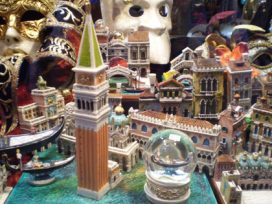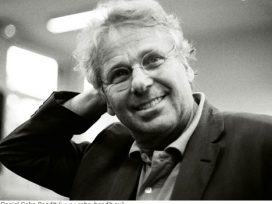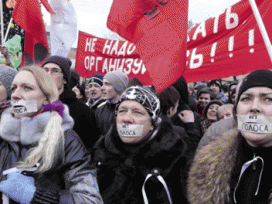In keeping with its “big society” scheme, the British Conservative Party’s recently revealed alternative to New Labour’s “state-sponsored multiculturalism” replaces top-down cohesion projects with community activities promoting “mainstream British values”. The centrepiece of the new policy? “The Big Lunch”, where neighbours get together for a meal on the weekend of the Queen’s diamond jubilee. Ali Rattansi sees the initiative as the latest in a line of equally ill-founded attempts across Europe to blame multiculturalist policies for social fracture.
Articles
Read more than 6000 articles in 35 languages from over 90 cultural journals and associates.
Conventional wisdom has it that violence is at least as prevalent today as it has ever been. Yet a vast body of evidence about the past shows incontrovertibly that the chances of an inhabitant of this planet dying violently have never been lower, writes Dan O’Brien, reviewing two new books on the history of violence.

The tune of the future
Italy: old Europe, new Europe, changing Europe
Venice versus Lampedusa: travelling around Italy, Slavenka Drakulic observes one kind of Europe being replaced by another. Instead of attempting to conserve the cultural past, we should accept that migration will adapt much of what we consider “European” to its own image.
Europe’s leaders need to take a hard look across the Atlantic before they start dismantling the Union, writes George Blecher. Emulating the US would risk forfeiting all the things that make Europe the best of all worlds.
IMF economist: Crisis begins with inequality
An interview with Michael Kumhof
Unless countries reduce income disparities the next financial collapse is inevitable, argues economist Michael Kumhof. Perhaps a surprising conclusion from a senior researcher at the IMF. In interview he argues that equality is the best recipe against crisis.
With demands over the wage and welfare in austerity Greece deemed illegitimate because unaffordable, what shape can struggle take? Demetra Kotouza sees the all-out attack on living standards as producing a de facto opposition that can’t be cohered by ideologies of class.

Angelina Jolie’s new film about a love affair between a Serb and Muslim, set during the Bosnian war, taps into a familiar dramatic trope but fails to explore the subversive potential contained in the victim-perpetrator relationship, argues Srecko Horvat.
From pacifist to cheerleader for US foreign policy, from dissident thinker to purveyor of “political kitsch”, Vaclav Havel was a figure that divided opinion. Nevertheless, right up to his death, Havel continued to pursue a consistent ideal, writes Stefan Auer.
Europe invents the Gypsies
The dark side of modernity
Social segregation, cultural appropriation: the six-hundred-year history of the European Roma, as recorded in literature and art, represents the underside of the European subject’s self-invention as agent of civilizing progress in the world, writes Klaus-Michael Bogdal.

Presidentialism: The French disease
An interview with Daniel Cohn-Bendit
The narrowly national agendas of the French presidential candidates, combined with a fixation on individuals over issues, damages the democratic process and runs counter to French interests internationally, argues Daniel Cohn-Bendit in interview with the journal “Esprit”.

Can Russia be modernized?
Problems, causes, opportunities
Plans to modernize Russia’s economy are resisted by bureaucracies benefiting from the country’s status as natural resource appendage of the developed world. That dependency on energy exports hinders political and economic progress is certain: but is high-tech the solution?
The fact that cultural allegiance is most vividly expressed not in ethical behaviour but aggressive parochialism suggests it has been instrumental in protecting human beings throughout their evolution, argues Mark Pagel.

Blatantly rigged elections are the easiest way for the Putin regime to mimic the authoritarian power it does not possess. December’s protests destroyed Putin’s reputation of being in control; even genuinely competitive elections would be unable to restore his legitimacy.
Thematizing the Balkan wars and the Israeli-Palestine conflict, Belgrade’s 2011 October Salon exhibition failed to get beyond dogmatic subjectivity and recycled preconceptions, writes Ana Bogdanovic.
With her finely tuned stories of romantic searching and social anomie, Maja Hrgovic offers a female perspective on the otherwise male literary terrains of wartime trauma, transition and urban bohemianism, writes Leda Sutlovic.
The face of the masses, the gaze of the masses
New matrixes of historical consciousness in inter-war Europe
The objectively perceived mass with its collective “face”, formless and thus formable? Or the mass as a subjective entity, endowed with a perceptual apparatus of its own? The drama of the Weimar Republic unfolded between these two poles, writes Stefan Jonsson.